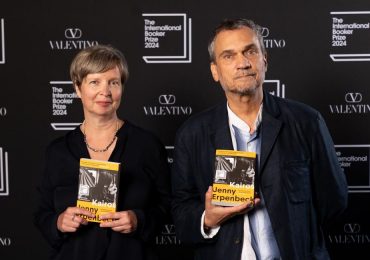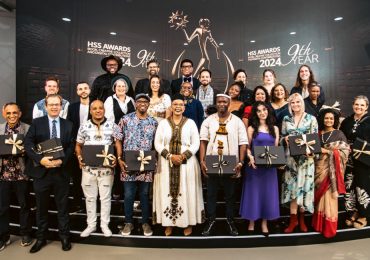Polish author Olga Tokarczuk and Austrian author Peter Handke have won the Nobel Prizes in Literature.
The announcement was made by the Swedish Academy this afternoon in Stockholm, Sweden.
Both winners will receive the full prize money of 9 million Swedish krona (about R13,8 million).
Tokarczuk, the winner of the 2018 award, was cited by the Nobel Committee ‘for a narrative imagination that with encyclopedic passion represents the crossing of boundaries as a form of life’, and Handke, who wins the 2019 award, ‘for an influential work that with linguistic ingenuity has explored the periphery and the specificity of human experience’.
Tokarczuk’s work was first translated into English in 1998, but her international reputation has exploded recently. She was awarded the Man Booker International Prize in 2018 for her novel Flights, and shortlisted again this year for Drive Your Plow Over the Bones of the Dead.
Handke is a more controversial choice. Since the nineteen-nineties, he has been seen as an apologist for far-right Serbian nationalism, and is a vocal supporter of Slobodan Milošević. In his 1999 book Step Across This Line, Salman Rushdie noted that Handke received the Order of the Serbian Knight from Milošević for his propaganda services during a visit to Belgrade, and that his ‘previous idiocies include the suggestion that Sarajevo’s Muslims regularly massacred themselves and then blamed the Serbs; and his denial of the genocide carried out by Serbs at Srebrenica’. Handke has been vigorously publicly criticised by Slovene philosopher Slavoj Zizek, as well as Susan Sontag and French philosopher Alain Finkielkraut, who called him ‘an ideological monster’.
In 2014, Handke criticised the Nobel Prize in Literature in the Austrian newspaper Die Presse, accusing it of ‘false canonisation’ and asserting that ‘The Nobel Prize should finally be abolished.’
It seems he’s had a change of heart. At the award announcement, it was confirmed that prize organisers had been in contact with Handke, telephoning him at home, and that the author had accepted the prize.
Awarding Handke the honour seems odd, at a time when the Nobel Committee is already courting conflict. The reason two Nobel Prizes in Literature were announced this year is because last year’s prize was postponed owing to a sexual harassment and corruption scandal.
The Swedish Academy is traditionally notoriously secretive about its methods for selecting a literature laureate. This year, however, in the wake of the criticism, it revealed that it had altered its criteria to incorporate a more ‘global’ outlook.
Of the 114 Nobel laureates in literature before this year, only fourteen were women. Just four have been from Africa. This week, Olsson hinted that this may change, admitting that the prize’s previous perspective was too ‘Eurocentric’ and ‘male-oriented’.
Today, Tokarczuk becomes the fifteenth woman winner of the award. But, despite perennial bookies’ favourite Ngũgĩ wa Thiong’o and Guadeloupean novelist Maryse Condé being tipped as possible winners, both laureates hail from Europe, a result that seems to cast doubt on the Academy’s proclamations.
For the first time ever today, in what could perhaps be construed as a cursory nod to its new, more transparent approach, the prize panel emerged from backstage to explain and discuss their decision making.
Because of last year’s disruption, the prize winners were selected by an extended committee this year, consisting of four members of the Swedish Academy and five external experts. The committee presented the Academy with its suggestions for two laureates, and the Academy decided ‘in accordance with the recommendations’. When asked about the Swedish Academy’s relevance in the new process, Olssen said: ‘We are not ready to evaluate this new process yet, that we will do next year. I will not say anything about the work conclusively today. I can only say that it has been of vital importance to us to bring in this external expertise during this phase. We have been stimulated by this dialogue and we will see what comes out of it.’
The majority of the conversation took place in Swedish, but Olsson concluded with a remark uncharacteristically humble for the Nobel Committee: ‘I will thank you all for coming here and showing your interest in us. Thank you very much.’
The Nobel’s prize money is significant, but unless the committee does widen its scope, as it pledged to do this year, its place at the pinnacle of the literary world is in danger of becoming unsteady, and the question becomes: how long will the reading public’s interest be maintained?
~~~
Read the chair of the Nobel Committee Anders Olsson’s introduction to the laureates:
Olga Tokarczuk made her debut in 1993 with her novel The Journey of the Book-People, but her great breakthrough came with the historical family saga, Primeval and Other Times, in 1996, which was translated into English in 2009, set in a mythical place somewhere in Poland, tracing the tragic Polish history from World War I to the liberation in 1989. In 1998 came House of Day, House of Night, translated in 2002. The novel composed of many stories and episodes, a kind of micro-epic typical of Tokarczuk, making it possible for her to represent a whole community, with many colliding fates and cultures.
She is a writer preoccupied with local life, but at the same time inspired by maps, and speculative thought, looking at life on earth from above. Her work centres on migration and cultural transitions, visible in one of her most fascinating prose works Flights, from 2007, translated to English in 2017.
Her work is full of wit and cunning, coming forth in the original crime novel Drive Your Plough Over the Bones of the Dead, published in 2009 and translated to English in 2018. Last but not least, the committee has been very impressed by her historical novel Jacob’s Books, appearing in 2014 and not yet translated into English. This thousand-page chronicle gives us not only a vivid portrait of the eighteenth-century sectarian leader Jacob Frank, by his followers proclaimed a new messiah, it present a rich panorama of a little-known chapter in European history.
Peter Handke is an Austrian writer with a vast production in different genres, narratives, essays, short prose and drama. He has also made films, and has been devoted to the visual arts.
He has for some decades been one of the most influential writers of contemporary fiction, part of the literary debate already in 1966, when he made his debut with a novel Die Hornissen and a play, Publikumsbeschimpfung. His most widely read narrative is Wunschloses Unglück (1972), in English A Sorrow Beyond Dreams (1975), written about his mother’s suicide. Handke has produced almost all of his works abroad, and lives, for thirty years, in Savills, south-west of Paris.
The committee has been struck by the recent great narrative Die Obstdiebin, from 2017, taking place in the French province of Picardie, with its acute awareness of the landscape and its nomadic theme. The narratives connected to some of Handke’s most praised works, such as Die Wiederholung from 1986, in English Repetition (1988) and Mein Jahr in der Niemandsbucht from 1994, My Year in the No-Man’s Bay, translated in 1998. With great artistry he explores the periphery and the unseen places.






Hi. Thanks for your observations on the latest two Nobel Prize winners. I will take a close look at both. I Googled last week to see who had won the 2019 Prize, and noted the announcement of the 2018 Winner, finally. Last year I, rather cheekily, suggested the Nobel Committee consider J L Borges :). Needless to say, I didn’t get a response, presumably as public nominations aren’t considered. I have read some of his books but lay no claim to expert knowledge. Perhaps you have a view on why the Nobel Prize has eluded him?
Thanks, regards
Alex